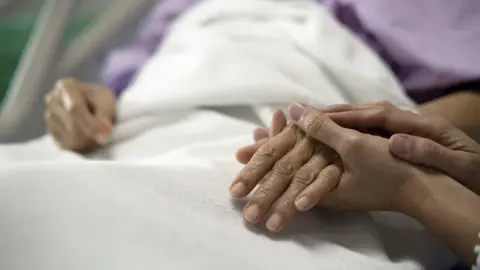Investigation into mental-health inpatient care in England
 Getty Images
Getty ImagesA national investigation into mental-health inpatient services in England has been announced by the government.
It will examine how trusts can learn from deaths in their care, how to improve young people's care and patients being treated far from home.
There has been huge concern recently over deaths of mental-health inpatients.
Charities welcomed the move, saying patients, families and carers must be closely involved.
It comes as an inquiry investigating deaths of mental-health patients in Essex has been given extra powers, and upgraded into a full public inquiry, to compel witnesses to give evidence.
The national investigation will start in October, when the Health Services Safety Investigations Body (HSSIB) is formally set up.
It will have the power to fine those who refuse to give evidence when they are required to do so.
A number of issues will be looked at, in both NHS and private services, including:
- how providers can learn from deaths in their care
- how to improve care for young people in inpatient mental-health services.
- how out-of-area placements are handled
- how many staff are needed in inpatient services
HSSIB chief investigator Rosie Benneyworth said any evidence would be kept anonymous.
"It is crucial that those impacted by poor care and those working on the front lines of the inpatient settings can share their experiences, reassured that HSSIB will use this information to improve care and not apportion blame or liability," she said.
Speaking in the House of Commons earlier, Health Secretary Steve Barclay said the investigation body would "have teeth and work at speed".
Rethink Mental Illness chief executive Mark Winstanley said there had been "appalling failures" in the standard of care delivered to people at their most vulnerable.
He said the investigation must have powers to issue alerts to improve patient safety but the government must also address "the staffing crisis" in mental health services.
"We believe that only if the government prioritises and urgently acts on these factors, can we prevent more avoidable tragedies and pave the way towards improved, safer care in mental-health inpatient units."
Identify risks
Mental-health charity Mind chief executive Sarah Hughes called the announcement "a crucial step in tackling the serious concerns we have about the state of mental health inpatient care in England".
"It is testament to the families who have fought for change because of the suffering their loved ones have endured in mental-health hospitals," she added.
The government has also published the findings of an independent rapid review into mental-health inpatient settings.
It heard from more than 300 mental-health experts, including carers, nurses, psychiatrists and patients, to determine how data could identify risks to patient safety in mental-health inpatient settings.
Geraldine Strathdee, who chaired the review, said she had been surprised how much of a burden data put on staff.
"Some clinicians reported spending half or more of their time entering data, taking time away from face-to-face therapeutic treatment and care of patients," she said.
